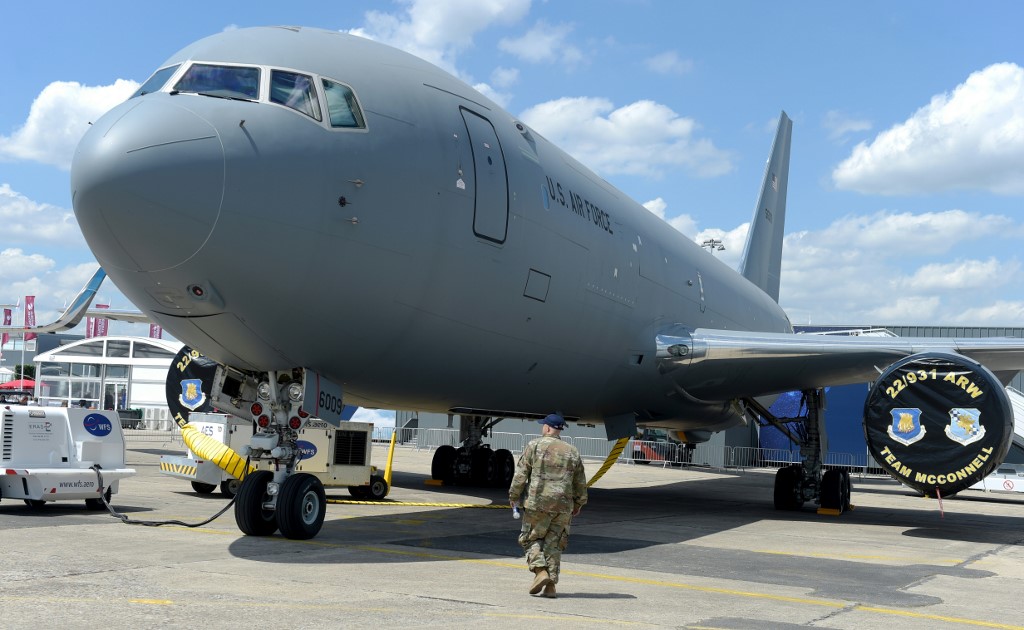A top Boeing executive apologised Monday for two crashes of 737 MAX jets that together killed 346 people, disasters which have pushed safety to the top of the agenda as aerospace firms gathered for the opening of the Paris Air Show.

A US Boeing KC-46 tanker is presented on the first day of the 53rd International Paris Air Show on June 17, 2019 at Le Bourget Airport, near Paris. (Photo: AFP)
The US aerospace giant is battling to regain the trust of passengers, pilots and regulators after a 737 operated by Indonesia's Lion Air flight crashed last October, followed by an Ethiopian Airlines jet in March.
"We are very sorry for the loss of lives as a result of the tragic accidents... our thoughts and our prayers are with their families," Boeing's head of commercial aircraft Kevin McAllister told journalists at the air show.
"Our priority is doing everything to get this plane safely returned to service. It is a pivotal moment for all of us," he said.
But McAllister and other executives faced a barrage of questions over Boeing's handling of the 737 MAX disasters, thought to be caused by a faulty MCAS anti-stall system.
Critics accuse Boeing of failing to sufficiently test a system that used just one sensor to determine if the 737 was at risk of stalling, and of failing to adequately inform and train pilots.
Reports also suggest that US safety regulators allowed Boeing engineers to self-certify the system, prompting worries of insufficient oversight at the planemaker.
McAllister said a planned fix for the anti-stall software would use two sensors, but it has yet to submit its proposal to regulators, who have grounded the plane indefinitely.
"We are very confident that the three layers of protection we are planning with the software update will prevent anything like this happening again," he said.
Europe's new fighter jet
Several executives at the Paris Air Show vowed to improve transparency over plane safety in the wake of the 737 MAX crashes, while also pledging to reduce emissions for an industry increasingly in the public spotlight.
Few blockbuster products or orders are expected at the world's biggest aerospace show, which brings together nearly 2,500 firms from 49 countries, and 290 official delegations, including government leaders and military chiefs.
But with passenger traffic slowing this year, the atmosphere at the fair, where arch-rivals Boeing and Airbus usually vie for aircraft orders, was markedly less self-congratulatory than in recent years.
President Emmanuel Macron inaugurated the event at Le Bourget airport after flying in on a hulking grey Airbus A330 refuelling tanker operated by the French Air Force.
He then attended the unveiling of a full-size model of the new fighter jet that France and Germany are promoting as a symbol of their efforts to bolster European defence autonomy at a time of fraying ties with the United States.
The stealth plane is part of the ambitious Future Combat Air System (FCAS) that includes next-generation drones and missiles, which would help reduce the EU's long reliance on US planes and equipment.
The cooperation framework was later signed by the defence ministers of France, Germany and Spain, so far the only other EU nation to join the project, which aims to have its new plane in operation by 2040.
Macron then toured the vast exhibition halls at Le Bourget, where dozens of companies are touting their efforts to make flying cleaner amid criticism of airlines' carbon emissions.
Airbus officially unveiled its A321 XLR jet, the latest iteration of its hugely popular single-aisle A320, which can now cross the Atlantic thanks to increased fuel efficiency.
That makes it an option for airlines which currently have to use bigger, fuel-hungry twin-aisle planes on longer routes.
The US-based Air Lease Corporation has signed a letter of intent to buy 27 of the planes, with deliveries to start in 2023.
Clouds on horizon
Both Airbus and Boeing have suffered a wave of order cancellations as airlines grapple with slowing passenger traffic growth since the start of this year.
And air cargo shipments, often an indicator of passenger traffic trends, have been slumping so far in 2019, reflecting the trade tensions prompted by US President Donald Trump's move to impose tariffs on several European and Chinese imports.
If the aviation market continues to soften, Airbus and Boeing could suffer their first disappointing year after more than a decade of solid growth driven in particular by the soaring numbers of people flying in Asia.
The two industry leaders can take comfort from jam-packed order books after hefty revenue growth last year, when their combined deliveries exceeded 1,600 planes.
Analysts say nearly 40,000 planes will be in service by 2038, double the industry's current fleet.


